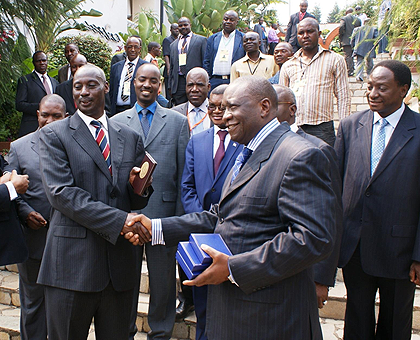An African neutral force, working under the auspices of both the African Union and the United Nations, should be deployed in the eastern Democratic Republic of the Congo (DRC) to help restore peace in the volatile region, a regional subcommittee composed of seven defence ministers has said.


An African neutral force, working under the auspices of both the African Union and the United Nations, should be deployed in the eastern Democratic Republic of the Congo (DRC) to help restore peace in the volatile region, a regional subcommittee composed of seven defence ministers has said.The subcommittee, established last week by a summit of Heads of State and Government from the International Conference on the Great Lakes Region (ICGLR), met in the eastern Congolese town of Goma on Thursday and drafted the modalities of the proposed force.The ministers are from Angola, Burundi, Republic of Congo, DRC, Rwanda, Tanzania and Uganda (Chair).The meeting was also attended by a special representative from the UN Secretary General.The committee was established during an extraordinary ICGLR Heads of State and Government Summit, held in the Ugandan capital, Kampala on August 7-8, and mandated to "propose urgent actionable steps to ensure that fighting stops completely to allow for consolidation of peace, security and stability; and to provide details on the operationalisation of the neutral International Force”.A statement released at the end of the closed-door meeting, which was held during most of Thursday through past midnight, indicated the meeting had been held in "a cordial and brotherly atmosphere”.The statement was silent about the details of the discussions and resolutions, only stating that a report would be submitted to ICGLR Chairperson, President Yoweri Museveni of Uganda, for onward submission to the grouping’s Heads of State and Government summit due next month.Specific recommendations were also made to ensure that the ongoing fighting stops immediately.Eastern DRC returned in the news three months ago for all the wrong reasons following desertion of mainly former CNDP rebels who launched a new rebel group, M23, named after the March 23, 2009 peace deal, under which they had been integrated into the government forces.The rebels have since captured a sizable territory in the North Kivu province, in areas close to the Ugandan border.The war has sparked heightened tensions in the region with both Kinshasa and a UN Group of Experts on the Congo accusing Kigali of backing the rebels, claims the latter has denied in a rebuttal, which the outgoing German Ambassador to Rwanda, Frans Makken, described as "very serious and satisfactory”.The defence ministers meeting was preceded by preparatory meetings of Chiefs of Defence Forces and Intelligence Chiefs, as well as Defence and Intelligence experts from the seven countries constituting the subcommittee.The eleven-nation member ICGLR also includes Central African Republic, Kenya, Sudan and Zambia.The ministers announced that a taskforce chaired by Uganda’s Chief of Defence Forces Gen. Aronda Nyakairima had been set up and tasked to fine-tune details of the proposed neutral force.In particular, the proposed force, to be deployed along the Rwanda-DRC border, will help flush out armed groups in operating in eastern Congo, including the Democratic Forces for the Liberation of Rwanda (FDLR), largely blamed for the 1994 Genocide against the Tutsi – in which more than a million people were killed.It was not immediately clear which countries would contribute troops to the proposed force, but in July, the African Union backed the move and promised to help raise troops.The initiative is seen as a direct indictment for the 20,000-strong UN Stabilisation Force in the Congo (Monusco), which has been in the area for 13 years with little to show on the ground for its presence despite running a staggering annual budget of US$1.3 billion."What remains is for me to take the report we have produced to the Chairperson of the Summit (President Museveni) for more guidance,” the ministerial subcommittee chairperson, Uganda’s Defence Minister Dr Crispus Kiyonga, told reporters shortly after the meeting.He added that if the Chairperson determines that more work needed to be done, the subcommittee would reconvene for further reviews. "We have put in place a mechanism to monitor decisions that are going to be made by the Heads of State on the recommendations that we have submitted”.The ministerial committee had been given a two-week deadline (which ends early next week) to submit an interim report, and then the final one two weeks later.Tanzania’s Defence Minister Shamsi Vuai Nahodha called on all the member states to support the recommendations from the meeting. "The spirit that this meeting has shown should arouse each member state to participate in the deliberations to eliminate the negative forces in this troubled region”.DRC’s Vice Prime Minister and Minister of Defence, Alexander Luba Ntambo, acknowledged the joint contribution towards pacifying North Kivu province, expressing optimism in the initiative. Ntambo was yesterday quoted by AFP as saying that the neutral force would comprise 4,000 troops.M23 rebels, who have not carried out major offensives in recent weeks, have called for talks with Kinshasa, claiming they have legitimate grievances that need urgent solutions, but the latter has rejected negotiations.


